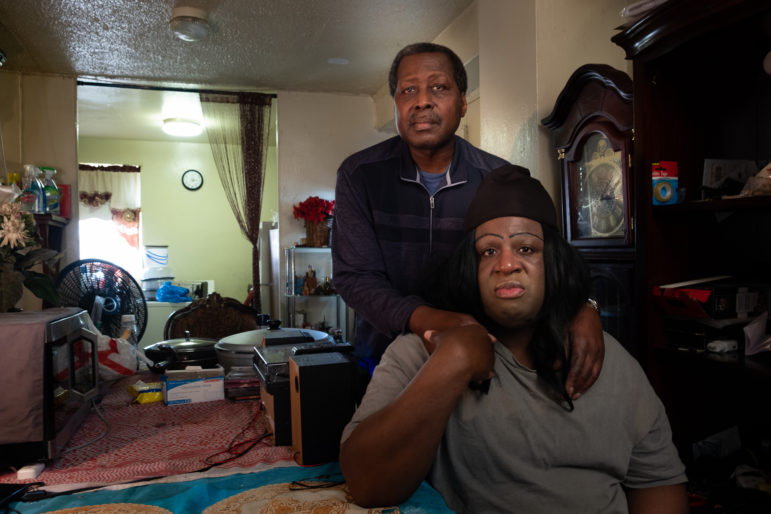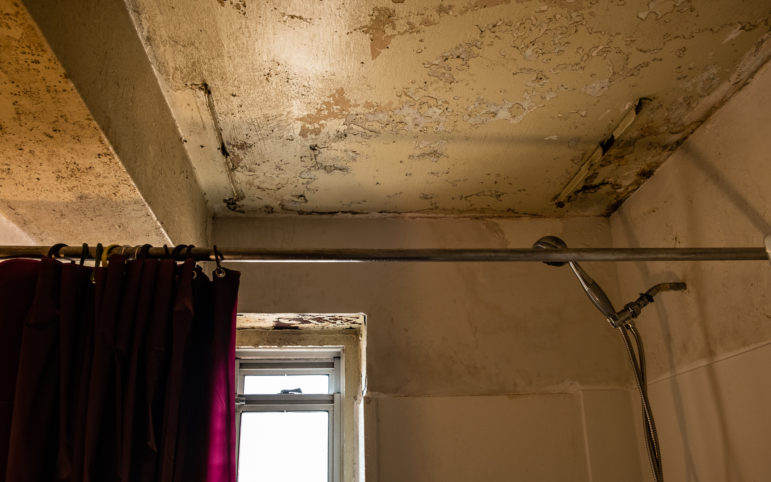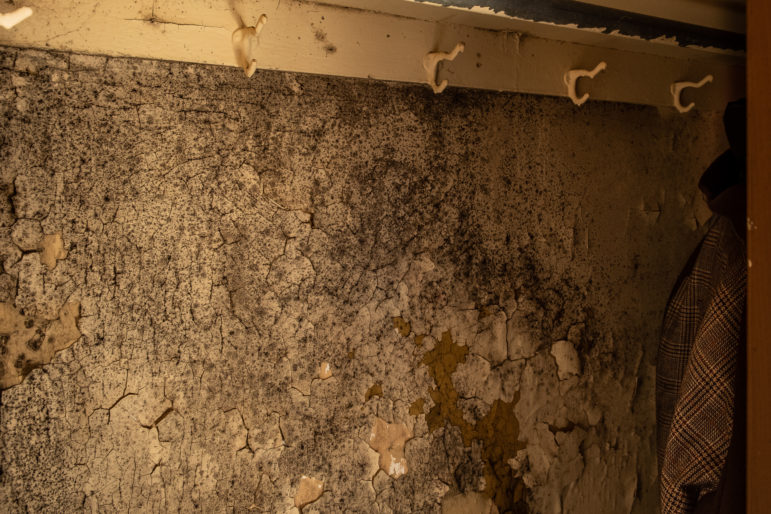“It’s time to acknowledge that NYCHA residents are an integral part of the city. Like other tenants, they should be entitled to full access to the city’s code enforcement system,” said one housing policy analyst calling for NYCHA tenants to have access to city building inspectors.

Adi Talwar
Kasey Colding with her fiance Curtis Bowman at her Red Hook West NYCHA apartment.Lea la versión en español aquí.
You could hear the frustration in Kasey Colding’s voice. “In the last 10-15 years it’s really started to deteriorate…downhill, downhill,” said Colding, who’s a resident of Red Hook Houses West, part of one of the oldest New York City Housing Authority developments. “Living in NYCHA today, you don’t know what to expect.”
It’s a frustration heard from housing authority residents across New York. Over recent weeks there have been numerous reports—from Gravesend Houses in Brooklyn to Fort Independence Houses in The Bronx—of residents in the city’s public housing developments struggling to get repairs. Such complaints are nothing new. In December, Public Advocate Jumaane Williams named the city’s worst landlords for 2021: the housing authority topped the list, for the fourth year running.
A law passed late last year by the City Council aims to help public housing residents lodge their complaints about repairs and services with the city and make the system more responsive. Rather than calling the housing authority’s service center, Local Law 127 enables public housing tenants to call the city’s own NYC311 customer service center to submit requests for repairs or complaints about lack of heat, hot water, elevator outages and other problems that plague many of the housing authority’s aging developments. The 311 center would then route the request to NYCHA. Additionally, the law requires 311 to publish an annual report on all the NYCHA complaints it receives.
“Providing resident access to 311 is an important step forward toward greater NYCHA accountability and transparency,” says Victor Bach, a senior housing policy analyst at the Community Service Society (a City Limits funder) who has argued for years that housing authority residents should be able to call 311 for help—just as tenants of privately owned buildings can do when their landlords fail to make repairs.
Yet it is unclear how much really changes with the new law and what difference it will make in helping tenants get timely repairs.
From the housing authority’s perspective, it appears not much at all. “This bill does not require any changes to NYCHA practices; it simply codifies existing 311 practices,” Rochel Leah Goldblatt, the housing authority’s deputy press secretary, wrote in an email response to questions about the bill and noted that NYCHA residents make extensive use of the authority’s own systems for requesting repairs or services.
NYCHA’s Customer Service Center, which opened in 2005, receives an average of 3 million calls a year, according to Goldblatt. That number dwarfs the 2,136 calls related to public housing maintenance made to 311 in the first two months of this year, according to the Department of Information Technology and Telecommunication, which runs the 311 system. The housing authority also launched the MyNYCHA app in 2015, which 115,000 residents have used to lodge complaints and requests.
But lodging a complaint doesn’t necessarily translate into getting timely repairs. In January of this year, there were a staggering 582,000 open work orders for the housing authority’s 177,000 apartments. That’s an increase of about 20 percent since January 2021, according to NYCHA’s website. The time it takes to get repairs has also increased markedly over the past year, from an average of 237 days in January 2021 to 297 days last January, a 25 percent jump. Even accounting for the effect of the COVID-19 pandemic on maintenance staffing, these are steep wait times for residents with leaking pipes, crumbling ceilings and other repair needs.
Given these delays, it’s no surprise that Bach thinks enabling complaints through NYC311 is not sufficient. He and others have argued that accessing 311 is only a part of the equation to help tenants leverage fixes and provide a broader public view of the repair needs at NYCHA. As he and Tom Waters recommended in a 2014 CSS report, along with complaints to the 311 system should be inspections by the city’s Department of Housing Preservation and Development or Department of Buildings and any violations found by inspectors should be part of the agencies’ public databases. “It’s time to acknowledge that NYCHA residents are an integral part of the city. Like other tenants, they should be entitled to full access to the city’s code enforcement system,” Bach said in an email.
Bach’s observation drives at a key, but sometimes overlooked, part of NYCHA’s ongoing problems. At a recent City Council budget hearing on public housing, Greg Russ, the housing authority’s chair and chief executive officer, laid a substantial part of NYCHA’s travails on “four decades of federal disinvestment.”
There’s no doubt declining federal aid has been a major hurdle, especially given the age of so many housing authority developments and the need to repair major building systems. NYCHA has estimated it needs about $40 billion in capital repairs to bring its buildings into good shape. But another part of the problem is that for a long time, NYCHA and its residents have been treated more like an appendage than an “integral part of the city.”
One example of this is the difference in how complaints about repairs or services by NYCHA tenants are handled compared with complaints from residents in other housing. When a tenant in a privately owned building contacts NYC311 it triggers an inspection by HPD or DOB, depending on the nature of the complaint. City inspectors will only come to NYCHA-owned apartments if ordered by Housing Court, and they often do so reluctantly, says Ross Joy, the director of housing and civil justice at the Red Hook Community Justice Center. He notes that when HPD does inspect, they send their findings to the court rather than NYCHA, underscoring HPD’s reluctance to tread on another housing agency’s turf.
Whether this seeming exemption from the city’s housing maintenance process is by law or agency practice remains unclear. An April 2020 memorandum from Columbia Law School’s Community Advocacy Lab contends that there are no legal barriers preventing HPD from playing the same role in public housing as it does with private housing, stating “it would appear HPD’s powers and duties under the [Housing Maintenance] Code pertaining to ‘owners’ and ‘multiple dwellings’ apply to NYCHA housing.” The memo also notes a 2009 state Appellate Court decision, Delgado v. New York City Housing Authority, “where the Court confirmed that HPD is authorized to seek sanctions and remedies against NYCHA for violations of the Code.”
Neither NYCHA nor HPD responded to questions about public housing and inspection procedures.
HPD inspections and the issuance of housing code violations is, of course, no guarantee of a quick fix. The pages of City Limits are replete with years of stories of private landlords ignoring violations. The top five worst landlords on the Public Advocate’s 2021 list together had an average of more than 6,000 violations that went unfixed last year.
Yet bringing HPD inspectors into NYCHA developments matters for several reasons, advocates say. Under the current system, if a tenant lodges a complaint, it’s up to NYCHA staff to determine whether repair is needed. As Bach of CSS puts it, “What happened in NYCHA stayed in NYCHA.” If repair or service requests automatically triggered an independent assessment it could help spur quicker fixes, especially for the most serious repair needs, and help rebuild trust between residents and the housing authority.
Joy of the Red Hook justice center says renewed trust is much needed, especially as NYCHA seeks to improve its process for making repairs, an effort he praises, and as it undertakes controversial public-private management partnerships under the Permanent Affordability Commitment Together program. It was only about five years ago that NYCHA was found to be falsifying lead inspection reports it sent to the federal government, resulting in the appointment of a federal monitor to oversee some aspects of NYCHA’s operations, including lead and mold abatement, elevator and heat repairs and reducing pest infestation.
Trust in NYCHA management has also been undermined by the housing authority’s institutional separation from the broader city. Some of this separation is a by-product of the authority’s foundation as a locally managed federal program. NYCHA’s roughly 350,000 residents can feel as if they’re part of a second city within the city, taken for granted institutionally and politically—a condition enabled, or enhanced, by resident demographics: roughly 88 percent of NYCHA families are Black or Hispanic with average gross incomes under $25,000, according to housing authority statistics. While the city has had a series of 10-year plans allocating billions of dollars to build and preserve housing, none of those plans have included NYCHA. (The de Blasio administration did separately increase city funding for NYCHA to partially offset the federal losses.)
The apparent exclusion of NYCHA from the city’s housing code enforcement system reflects another manifestation of that separation. There are little consequences for malfeasance. After tenants at a NYCHA development in the Rockaways went to court after spending months without heat, a judge commented during the hearing, “If this was a private small landlord he would be in jail by now.”
Even when money is available for a specific repair, the housing authority seems to fumble it. At the recent City Council budget hearing on public housing, Council Member Rafael Salamanca Jr. lambasted NYCHA for its failure to spend $3 million he allocated in fiscal year 2018 for door repairs for a NYCHA development in Melrose. Nearly five years later the tenants are still waiting. With NYCHA officials telling him the repairs won’t be complete until 2024, Salamanca urged his Council colleagues not to allocate funds to the housing authority.
For residents, such travails are a constant. Even Russ seems to acknowledge that, commenting during the Council budget hearing that residents have experienced “a near daily cascade of issues.”
Part of that cascade stems from NYCHA’s own byzantine system for getting work done. Colding, the Red Hook Houses West resident, says she had a problem with mold in her bathroom. Two years ago, NYCHA began the repairs. The sink sat in her bedroom for months and, she says, she had to plead to have the toilet reinstalled. The plumber comes and makes their repairs. Then a new request, a new work order, must be made and scheduled for the wall to be repaired, then another for painting. “It can take months. It can take years,” she said.
Russ told the City Council changes are planned for how repair requests are handled, and all work for a single project, like for Colding’s bathroom, will be scheduled with one phone call.
Efforts to fix NYCHA seem to proceed piecemeal, much like Colding’s bathroom repair. Although Local Law 127 requires an annual report on the calls received from housing authority residents, it doesn’t say much about what kind of information should be reported. Currently, about all 311 captures is that there was a call and it was forwarded to NYCHA’s service center. Legislators in Albany have proposed bills that would require HPD and DOB to publish information on their websites about open code violations in public housing developments, just like the two agencies do for violations found in privately owned buildings.
Each of these steps, from enabling service calls to 311 to sending city inspectors to independently assess complaints to making housing authority violations part of the city’s violation databases, is a move towards treating NYCHA—and more importantly its residents—like an integral part of the city. They may be small steps, and they won’t solve NYCHA’s problems. But it helps.











5 thoughts on “Under New Law, NYCHA Tenants Can Log Maintenance Complaints with 311. But Advocates Want More Substantial Changes”
The MyNYCHA app is also available online at –
https://my.nycha.info/MyNYCHA/#/login
NYCHA is a constant drain on NYC taxpayer’s dollars.
NYCHA residents are taxpayers also!
It’s not like people are actually stealing nycha money it’s that the cost to run and repair these aging developments is overwhelming. I have seen management really try to help the development but the cost for things is crazy
There has been complaint about possible Asbestos and attendance apartment. A maintenance person told the tenant they do not want to fix the tile because they feel it’s asbestos. The tenant complained about four months ago the tenant can be living in danger what does the tenant do about this.
I want to know where to complain about apartment I suppose to rent from housing on 93rd street and 1st Avenue I paid for a month rent and a month security in Feb 2022 and still have not moved in they keep telling me they waiting for inspection for lead it going on 7 months now please need help keep giving me the run around please help need to move I live in a very small room please thank you